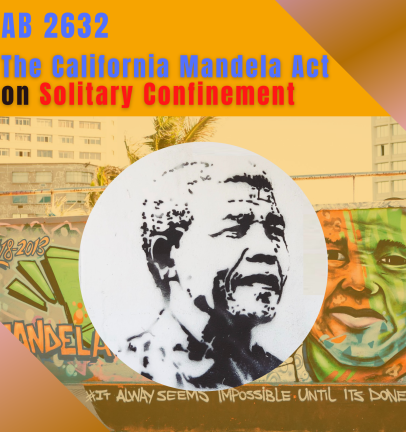Limiting Solitary Confinement in California - AB 2632
AB 2632 would severely limit the use of solitary confinement for specific populations

Solitary confinement stands as one of the most dire human rights issues of our time. Solitary confinement exacts significant human and fiscal costs. Prolonged solitary confinement has also been determined to constitute torture. There is wide ranging evidence from national experts that solitary confinement is not only more expensive than other forms of confinement, but also increases violence, recidivism and overall costs to our society. Individuals subject to solitary confinement are less likely to be released on parole, and more likely to be rearrested, prolonging a cycle of incarceration and the high costs associated with it.
In 2015, a legal settlement was set to end the practice, for all practical purposes, of extended solitary confinement in California. That same year, Kalief Browder ended his life after spending over 700 traumatizing days in isolation at the Rikers Island jail complex in New York for allegedly stealing a backpack. Browder’s death and the California settlement brought nationwide attention to solitary confinement, a cruel practice that eliminates human contact except for a few minutes a day.
President Obama called on the nation to end the practice of solitary confinement, noting that studies show that it tends to increase hostility and violence. “Do we really think it makes sense to lock so many people alone in tiny cells for 23 hours a day for months, sometimes for years at a time?” Obama asked. “That is not going to make us safer. It’s not going to make us stronger. If those individuals are ultimately released, how are they ever going to adapt? It’s not smart.”
In the years since, New York, New Jersey, Colorado joined a dozen other states with passing laws that greatly reduce the use of solitary confinement. But despite the 2015 legal settlement, California still hasn't ended the practice, largely due to needing concrete uniform and universal rules governing the use of solitary confinement.
The California Mandela Act on Solitary Confinement (AB 2632) sponsored by Assemblyperson Chris Holden (D41) would would prohibit jails, prisons and other institutions from keeping a person apart from others (not counting prison staff) for more than 17 hours a day, for more than 15 consecutive days. It would also bar isolation for more than 45 days within any 180-day period and ban isolation completely for people who are particularly vulnerable, including pregnant and postpartum women, people with defined mental or physical disabilities, and prisoners younger than 26 or older than 59.
The bill has passed both the California State Assembly and Senate and awaits Governor Gavin Newsom's signature.
A reduction and overall elimination of solitary confinement would lead to savings, both in terms of costs but also, most importantly, human life. Studies on the reduction of solitary confinement and its impact on incarcerated individuals and facility staff have shown “improvements in their health and well-being, enhanced interactions with one another, and less exposure to violence.”
You can read and download this PDF report, "The Cost of Solitary Confinement: Why Ending Isolation in California Prisons Can Save Money and Save Lives", from the Immigrant Defense Advocates.










